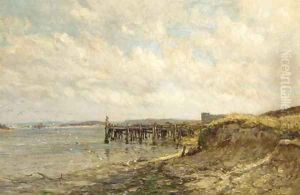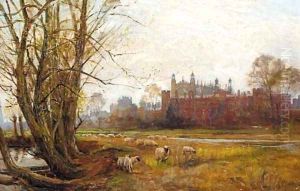Frederick William Newton Whitehead Paintings
Frederick William Newton Whitehead, born in Leamington Spa, Warwickshire, England in 1853, was a British artist known for his watercolor landscapes and natural history illustrations. His artistry was deeply influenced by the English countryside, and he became well-regarded for his ability to capture the essence of rural England with a particular focus on plants and gardens.
Whitehead's education in art began in his hometown before he further honed his skills at the South Kensington School of Art in London. His proficiency in watercolor was evident early in his career, and he was recognized for his meticulous attention to detail and his vibrant use of color. Whitehead's works often reflected a Victorian fascination with the natural world and the beauty found in everyday rural settings.
Throughout his career, Whitehead exhibited at various prestigious institutions, including the Royal Academy and the Royal Watercolour Society. His exhibitions showcased his versatility in both subject matter and technique. He was particularly adept at capturing the changing seasons and the various moods of the landscapes he painted.
In addition to landscapes, Whitehead was also a skilled illustrator. He contributed illustrations to a number of botanical and gardening books, where his precision and accuracy in portraying plant life were greatly appreciated. His illustrations were not only beautiful but also scientifically valuable, contributing to the knowledge of botany during his time.
Despite his success, Whitehead remained a relatively private individual, dedicated to his craft and the natural environment which inspired his work. He was more than just an artist; he was an observer of the subtle nuances of the English countryside, and his paintings served as a testament to the idyllic and pastoral visions of rural Britain. Whitehead passed away in 1938, leaving behind a legacy of artwork that continues to be admired for its beauty and historical value.

